If you’ve booked enough airline tickets — whether paying cash or redeeming points — odds are that you’ve seen mention of fuel surcharges (otherwise often referred to as carrier imposed surcharges). What exactly are these surcharges, do they really matter, and are there any ways to avoid paying them? I wanted to address that in this post…
In this post:
The history of airline fuel surcharges, and how they’ve evolved
For background, airlines first introduced fuel surcharges back in 2004, when there was a sudden spike in the price of oil. Initially the idea was that this would be a temporary surcharge, to reflect the increased costs that airlines were incurring from higher oil prices.
That wasn’t totally unreasonable at the time, and we’ve seen similar surcharges in other industries as well (though logically you’d think that airlines would just adjust ticket prices to reflect costs, rather than adding a surcharge for a particular thing — for example, airlines haven’t added “labor surcharges,” even though the cost of labor in the industry has gone up).
However, as is all too common, what was initially supposed to be a temporary surcharge has become permanent. Even when the price of oil decreased, airlines kept these surcharges around.
Nowadays you’ll find that in many markets, fuel surcharges make up a majority of the fare. For example, take a $572 roundtrip New York to London ticket on JetBlue. When you look at the fare breakdown, you’ll see that the base fare is $0.50 per direction, the carrier imposed surcharges are $320, and then there are a bunch of other mandatory taxes and fees, including the UK’s hefty Air Passenger Duty (APD).

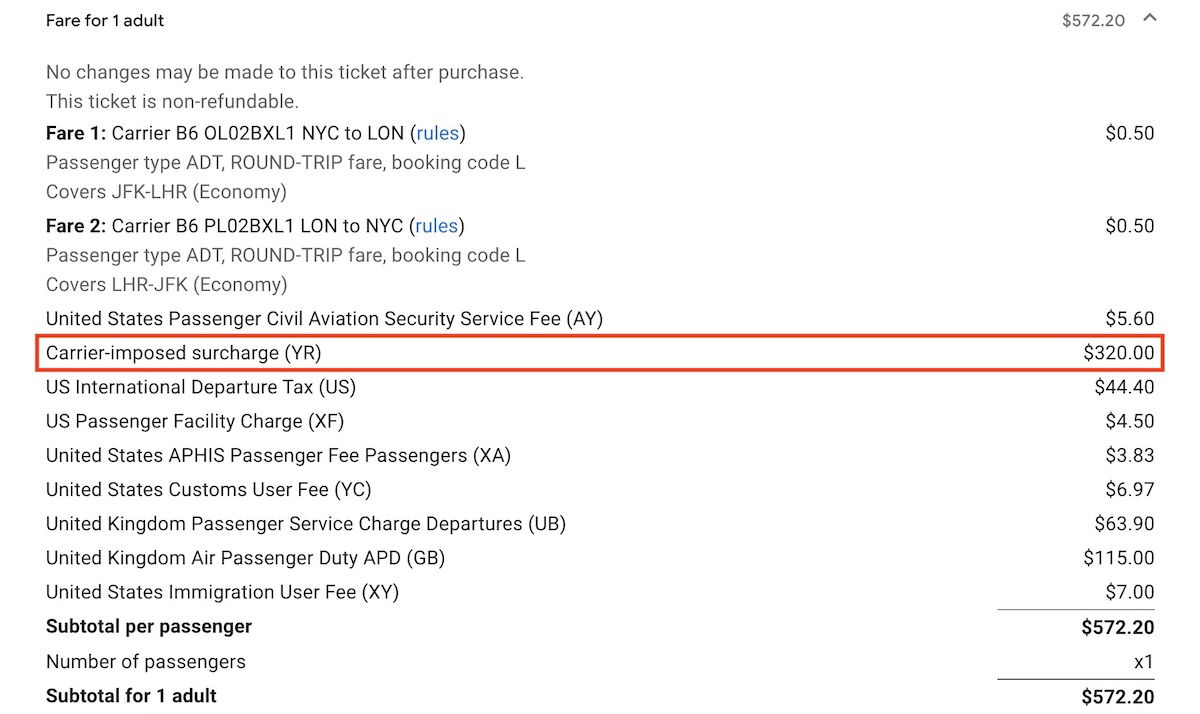
So yeah, it goes without saying that at this point the whole carrier imposed surcharge concept has gotten a bit out of hand, when your fare is $1, and your carrier imposed surcharges are $320. Kind of absurd, no?
It’s also worth emphasizing that fuel surcharges don’t actually reflect the distance flown, or your “portion” of the fuel bill. Fuel surcharges are market based, depending on your origin and destination, so they’re largely based on the competitive landscape. For example:
- Fuel surcharges for a one-way British Airways business class ticket from Stockholm to London to New York are $441, while if you take just that same London to New York flight, the surcharges are $588
- Fuel surcharges can also vary based on the direction you’re traveling in; a $588 fuel surcharge from London to New York could cost $1,000 in the other direction of travel
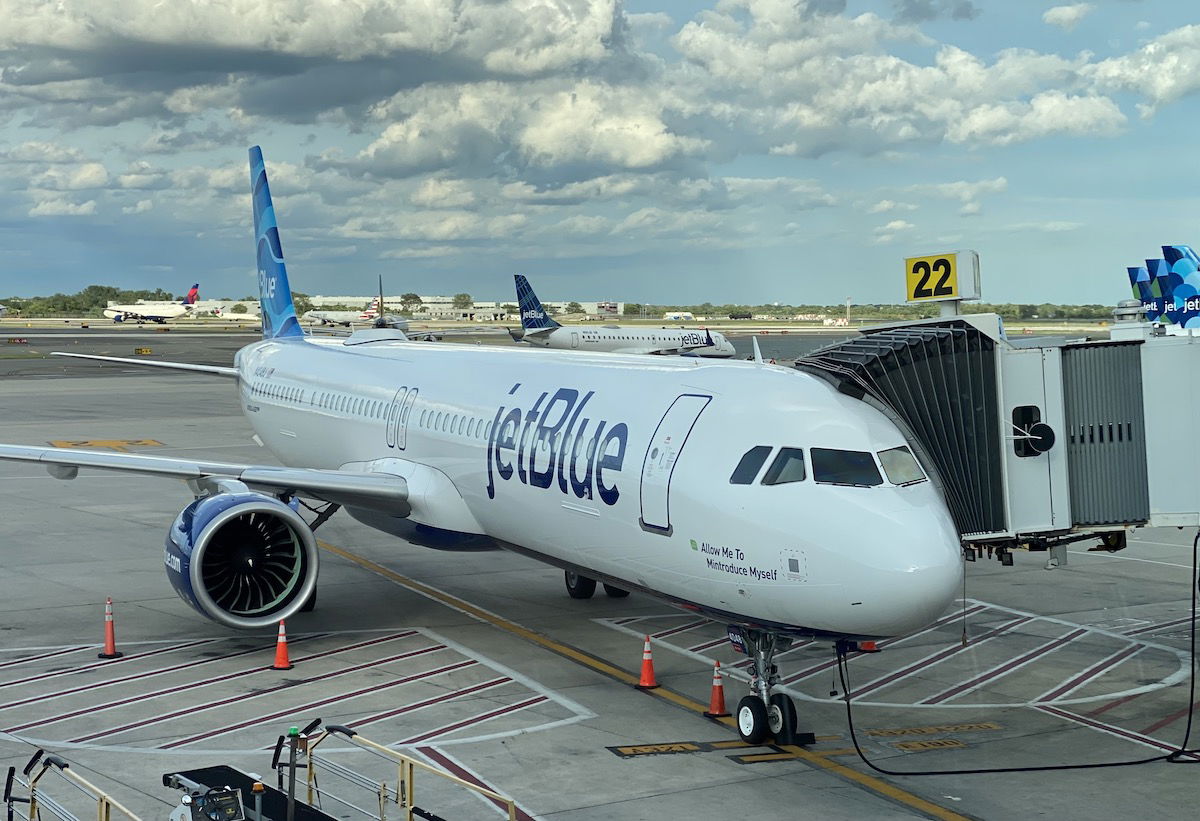
Why airline fuel surcharges don’t matter for most consumers
The reality is that in a vast majority of situations, the existence of carrier imposed surcharges doesn’t exactly impact consumers.
For one, airlines have been forced to become more transparent about these surcharges:
- Most governments require airlines to market “all-in” fares, including all mandatory taxes and fees, so airlines can’t market fares without including these surcharges
- Airlines generally can’t even call these fees “fuel surcharges” anymore, but rather have to refer to them as “carrier imposed surcharges”, given that they have little to do with the price of fuel
- Some countries even regulate these surcharges, and prevent airlines from adding these when travel originates in those places
The reason airline fuel surcharges won’t matter to most consumers is because they don’t actually make tickets more expensive. If it weren’t for fuel surcharges, it’s not like the above JetBlue ticket would otherwise cost $1. Odds are that without fuel surcharges, the base fare would just be increased by $320, so you’d end up paying the same.
Historically when airlines have raised or lowered fuel surcharges, they simply adjusted the base fare accordingly. In other words, if fuel surcharges went up by $50, the base fare may have gone down by $50. Of course in the case of some transatlantic itineraries (like the one I highlight above), the fare couldn’t get much lower, aside from those surcharges…
So my point is simply that you’re not paying more for your ticket because of the existence of surcharges. These aren’t “hidden fees,” because at all stages of the research and booking process, you see the all-in fare. Airlines price their tickets based on what the market will sustain and what consumers are willing to pay. Since they have to market all-in pricing, it doesn’t really matter how that fare is broken down.
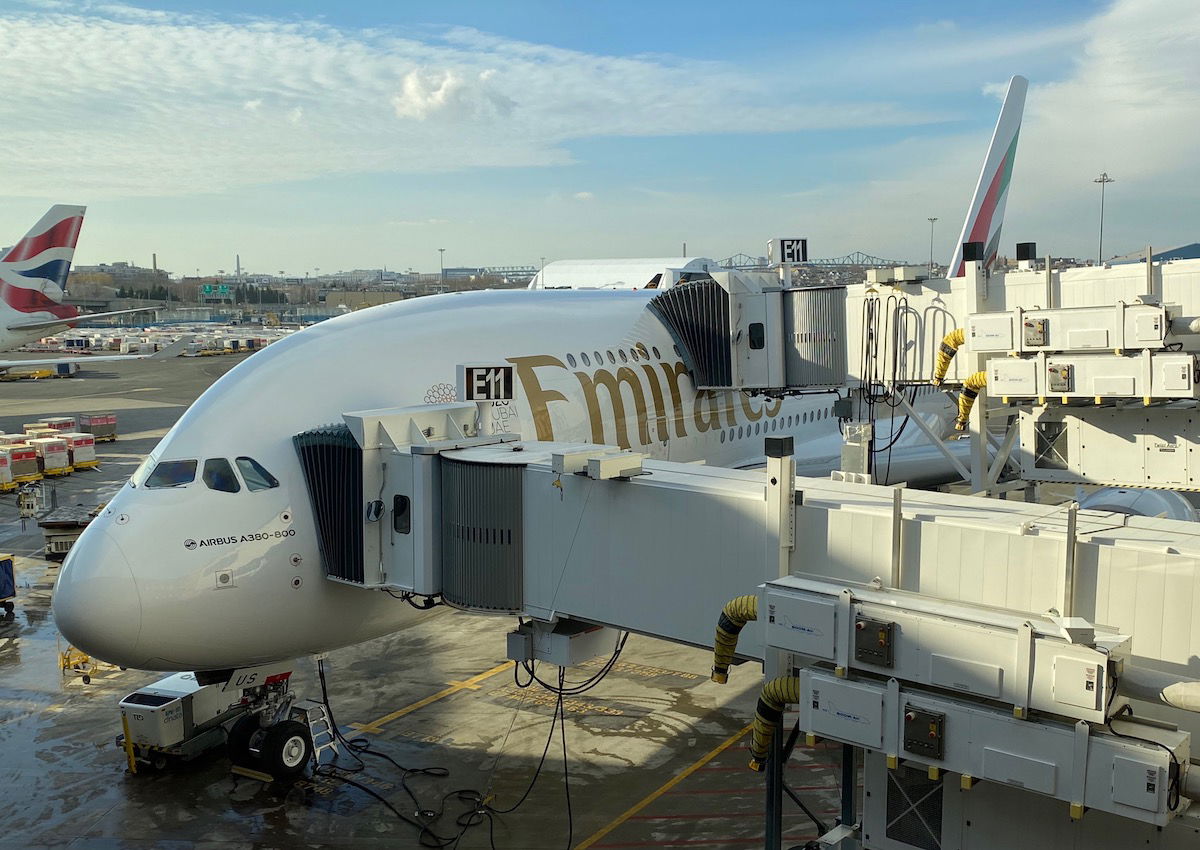
Why airlines continue to add fuel surcharges to tickets
If airlines have to market all-in fares, and if fuel surcharges don’t generally cause fares to increase, then what’s the upside to airlines charging these fees? That’s a great question. It generally comes down to a few factors.
First of all, in some cases airlines are able to pass on carrier imposed surcharges on award tickets, meaning you have to pay that cash portion of the ticket, in addition to the miles you’re redeeming. I’ll talk more about that in a bit, but it can certainly help the economics of award redemptions for airlines, even if us consumers hate it.
The second reason is probably the more significant. I could be mistaken, but I believe that these surcharges are generally most beneficial to airlines in a couple of ways:
- Travel agents generally get a commission on base fare, and I believe that typically doesn’t include the carrier imposed surcharges (not that commissions are big on most types of airline tickets nowadays)
- For corporate contracts that offer a percentage discount, that typically also applies to the base fare, and excludes carrier imposed surcharges
So these surcharges allow airlines to shave a bit off of travel agent commissions and reduce the savings with corporate contracts, but that’s about the only upside, as far as I know (and it’s possible that policies have changed over the years, and this no longer even applied — someone correct me if I’m wrong here). I don’t think airlines have any major tax benefits from this nowadays, though that may have been a factor in the past.
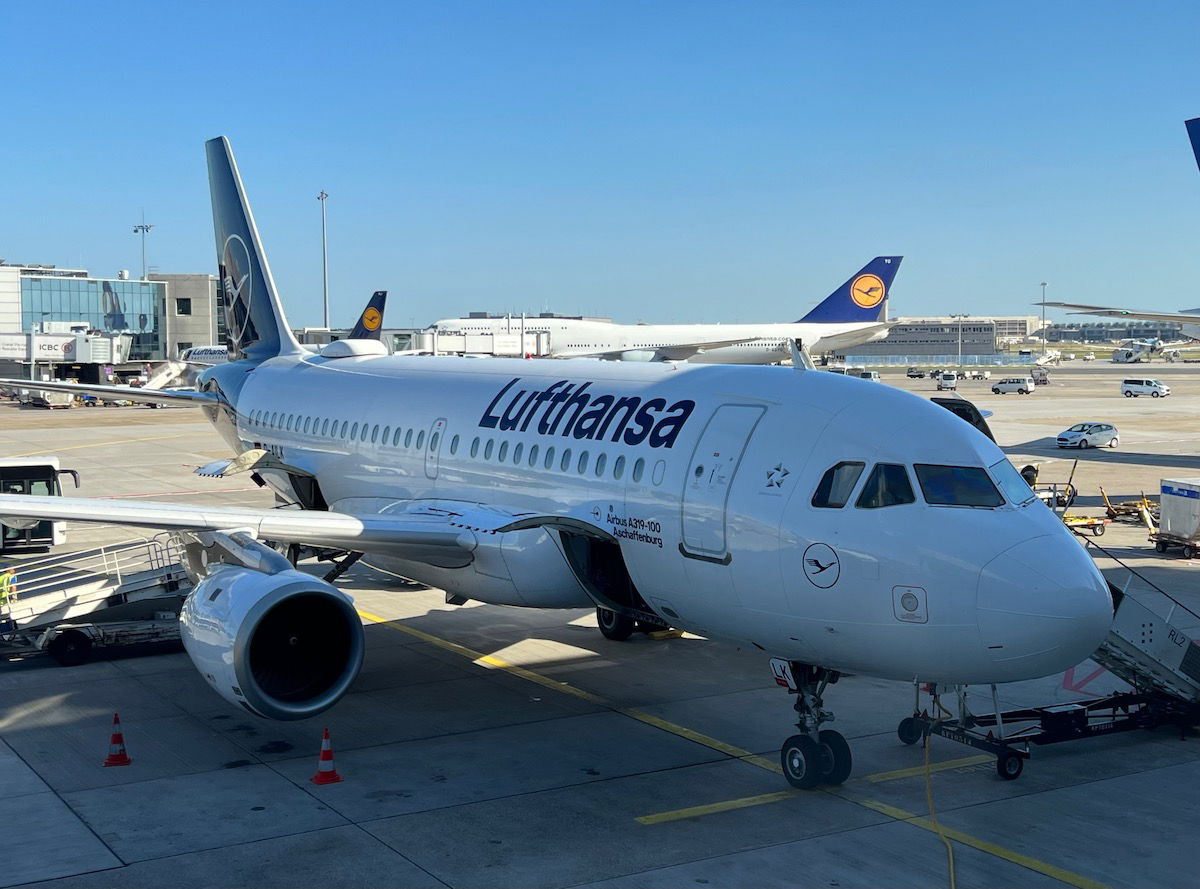
Why & when fuel surcharges matter when redeeming miles
As I explained above, if you’re a consumer just booking a revenue ticket directly with the airline, then these surcharges don’t really impact you much. The situation where consumers will most consistently be impacted by surcharges is when it comes to redeeming miles & points.
Let me just say upfront that this can be kind of complicated:
- Generally the frequent flyer program you’re booking through determines whether to impose fuel surcharges on redemptions or not
- Whether a program passes on these surcharges can also vary based on which partner airline you’re traveling on, or which region you’re traveling in
- What further complicates this is that some award redemptions have the same carrier imposed surcharges that you’d be on the hook for if you were booking a ticket with cash, while some programs simply have redemption surcharges, which are essentially a cash co-pay, and aren’t correlated to the surcharges on awards
Clear as mud, right? 😉
Let me give a few examples. Say that you want to fly from New York to London in British Airways business class using points. If you were to redeem American AAdvantage miles, you’d pay 57,500 miles plus $732.30 in taxes and carrier imposed fees. Indeed, American is passing on the carrier imposed surcharges that British Airways would charge on a revenue ticket.
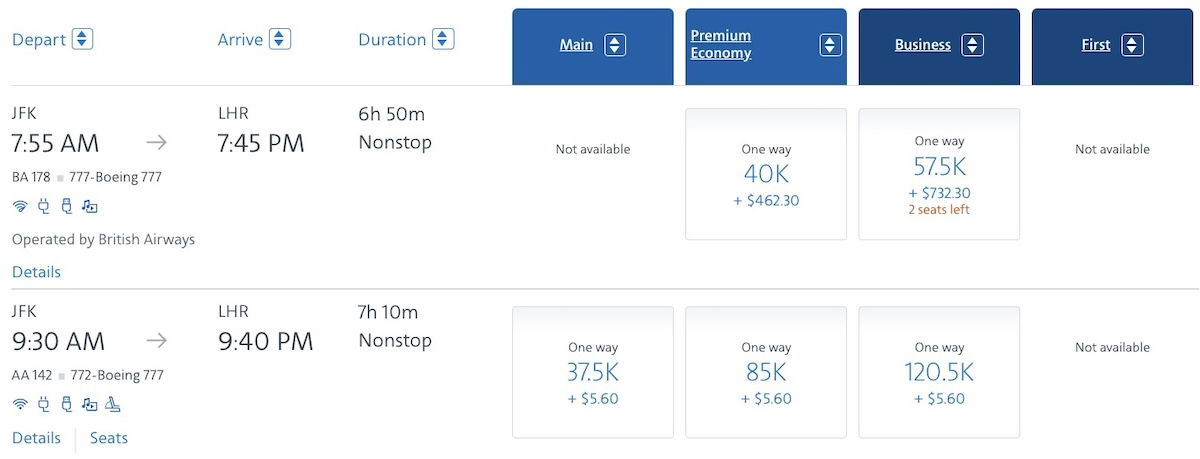
Meanwhile if you redeemed British Airways Executive Club Avios, you’d instead pay $375 in cash. This is because British Airways has the “Reward Flight Saver” concept, whereby you pay a fixed amount in cash on certain redemptions, which doesn’t directly correlate to the fuel surcharges.
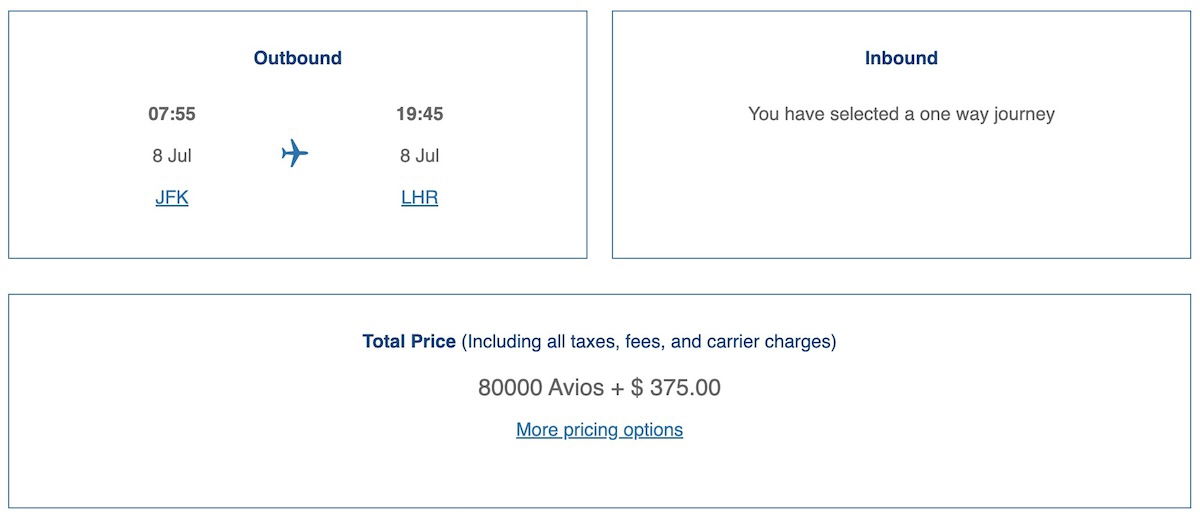
Programs are all over the place when it comes to their policies for fuel surcharges on award tickets. Just to give some examples:
- Air Canada Aeroplan doesn’t impose fuel surcharges on any kinds of award tickets nowadays
- Alaska Mileage Plan only passes on carrier imposed surcharges on select partners, like British Airways and Icelandair
- British Airways Executive Club and Qatar Airways Privilege Club have redemption fees, which aren’t directly correlated to the carrier imposed surcharges on tickets
- Emirates Skywards consistently passed on fuel surcharges to consumers on award tickets, regardless of the route or cabin you’re flying
So there’s huge value in being strategic about the programs you redeem points through, so that you pay the fewest points, and also pay the least amount in taxes and fees. This is why there are some great arbitrage opportunities, and why some programs have sweet spots.
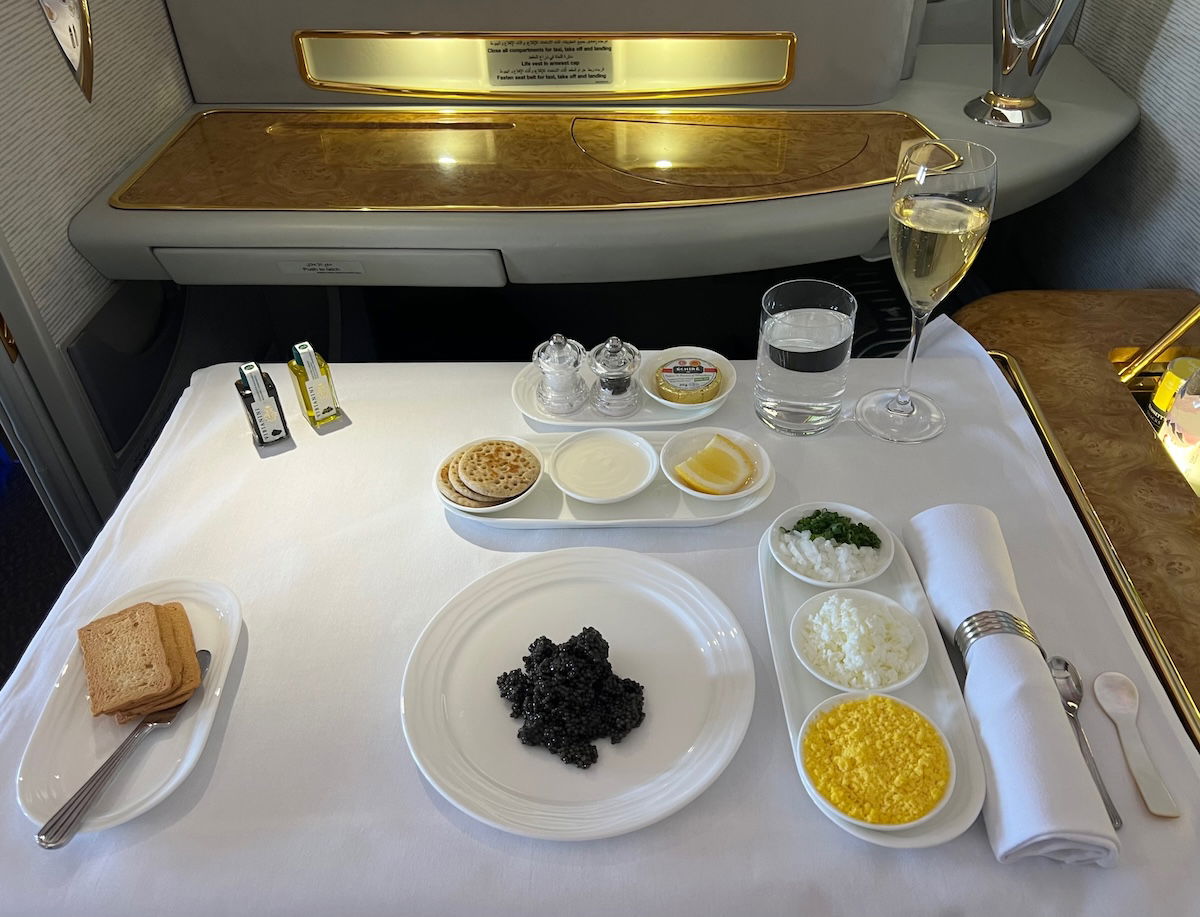
How to look up carrier imposed surcharges
If you’re curious to look up carrier imposed surcharges, how can you most easily see those? Well, typically when you book an airline ticket, you should see a breakdown of the fare. Just look at the section about carrier imposed surcharges, and that should tell you how much you’re paying in those fees.
For example, take a roundtrip American ticket from New York to London, which costs a total of $407. If you click on the “Price and tax information” section on the itinerary summary page, you’ll see the breakdown of the ticket cost.
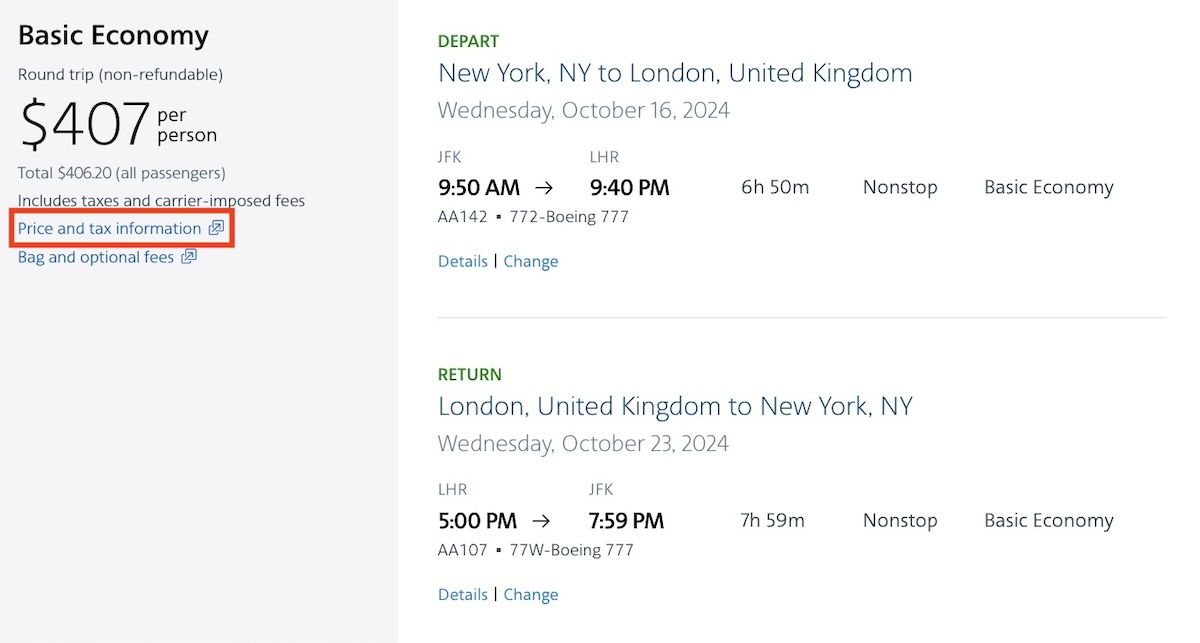
Here you’ll see that “carrier imposed fees” total $154, while the fare is just $1. The rest are all taxes and government imposed fees.
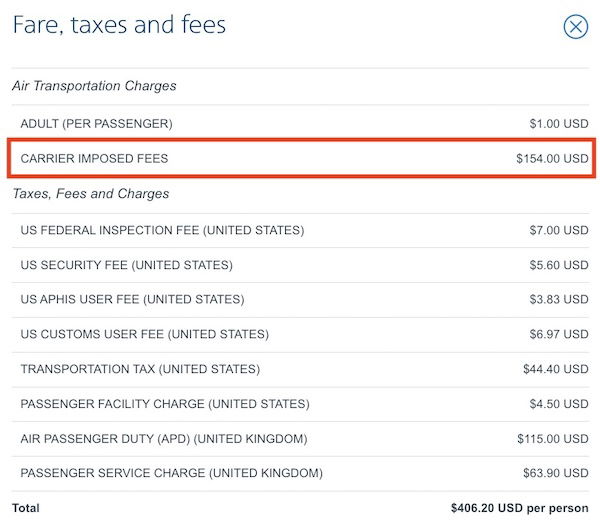
Alternatively, ITA Matrix is a great website for looking at the breakdown of fares. You can just enter the routing you’re looking for, pick the flights you want, and then you’ll see a breakdown of the fare, just like I’ve shown above with JetBlue. You’ll just want to look at the section labeled “carrier imposed surcharges,” which often has the code “YQ” or “YR.”
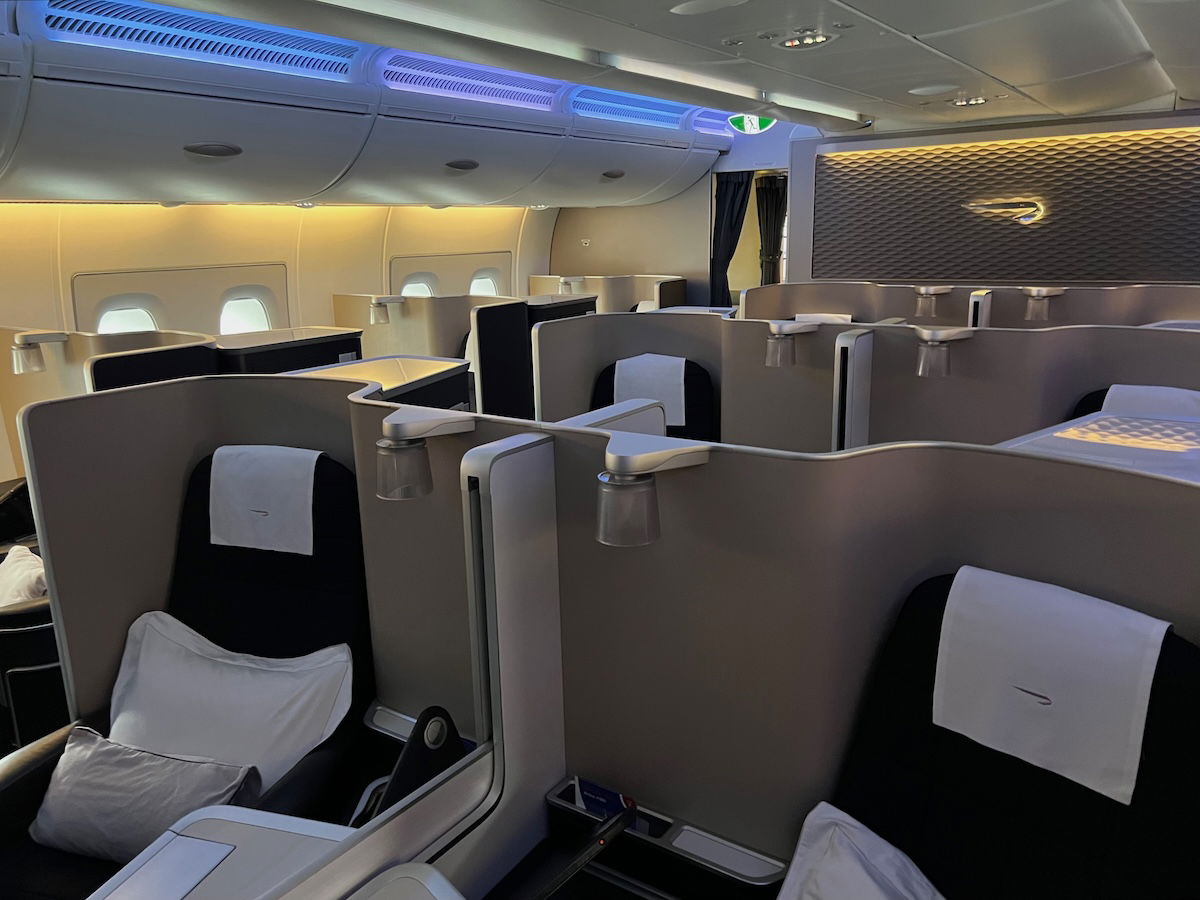
Bottom line
Airline fuel surcharges (or carrier imposed surcharges, if you prefer) tend to confuse consumers, and it’s for good reason, as they don’t actually make a whole lot of sense. These surcharges were introduced decades ago in response to a temporary increase in oil costs, but they were then never eliminated.
If you look at the breakdown of the cost of many airline tickets, you’ll find that a majority of the fare is often these surcharges, while the base fare may only be $1, or sometimes even less.
However, for most consumers, these surcharges shouldn’t be of any concern. Airlines have to market all-in fares, and you’re not actually paying more because of these surcharges than you’d otherwise pay. The fare would just be structured differently.
For airlines, the primary benefits of these surcharges are some savings when it comes to travel agent commissions and smaller discounts with corporate contracts. The primary situation in which consumers should really care is when redeeming points, as some programs and airlines do pass on these surcharges to consumers.
What’s your take on the airline fuel surcharge concept?





Airlines are in the business of extracting as much money as possible from their clients.
Once you accept this simple axiom, everything else makes (sad) sense.
And then there is ANA who last year said they were increasing award redemption points cost but will offset by reducing fuel surcharges. They did indeed increase redemption. Instead of 85k from us to Japan it's now 117k but not one yen was dropped in taxes and surcharges. Sooo awesome.
They are not fuel surcharge but carrier imposed fees hence not linked to the fuel price.
All major markets are 0% commission.
Aren't miles in revenue based FF programs only awarded on base fare?
Please! Stop using "fuel surcharge." As you say, these carrier-imposed fees have no relationship to fuel prices, so just say "carrier-imposed fees." BA was even sued for using the former name when the fees stayed in place while fuel prices dropped to a 40-year low.
All of the above is why I avoid commercial air travel if at all possible.
Another fun observation is when the airlines run their little promos: "this week only, use code FALL2024 to save 30% off base fares!!".
Great, I see a $500 flight and look forward to the savings. Oh wait, the base fare is $100, surcharges are $300 and taxes are $100 so I'm only saving $30 on that $500 ticket...
After Mayor Pete finishes his DEI training, I'm sure he will look into this...
What a stupid, useless comment.
Fuel surcharges are a scam when crude oil prices are falling, and quickly.
@Ben Schlappig @Lucky Have you noticed that on one way Emirates awards from countries which ban/severely restricted EK still has obscene surcharges? I.e. $500 usd syd-dxb in J one way. Yet there's none on a cash ticket. If they're illegal then they're illegal right? Why would they still be charged on only awards? Again this is exclusively for countries with bans/severe restrictions in place.
A scam that even doesn't effect you is still a scam.